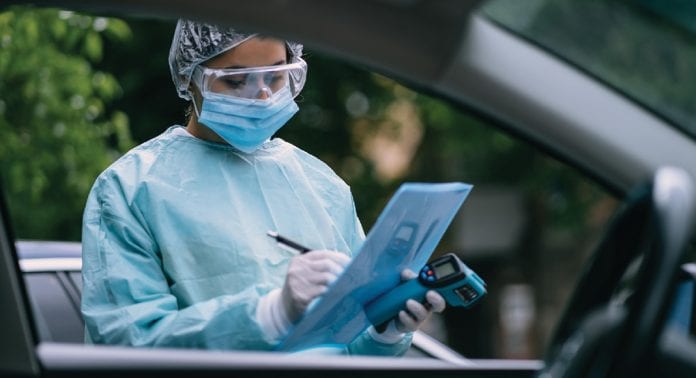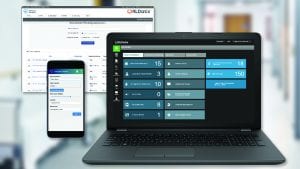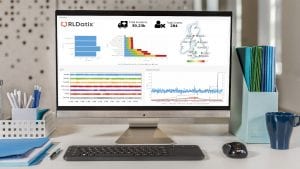
Proactive patient safety and risk prevention are key to helping healthcare organisations surveil and mitigate global and local risks.
Currently, the world is in crisis – a global health security crisis. Often the default response is to focus on innovation or reinventing existing solutions to meet a potential catastrophe. While this may be the norm, it is not the only answer. Instead, we can look to what exists and what solutions are available that, if slightly adjusted, adopted properly, combined, and administered, will result in the tools and vision to see us through the current dilemma.
Back in 2005, the World Health Organization’s (WHO) International Health Regulations ― regulations meant to improve and strengthen a country’s public health response to threats of disease and thereby help ensure healthcare capacities and security ― had yet to be adopted. Earlier, in 2003, the global economy had suffered a $30bn loss due to Severe Acute Respiratory Syndrome (SARS). And 2009 marked the battle with the novel influenza A (H1N1) that resulted in more than 201,000 respiratory deaths and an additional 83,300 cardiovascular deaths, for a total of more than 284,500 attributed deaths.1
We have known for a long time that the ease of global travel would make controlling a rapidly moving and contagious pathogen incredibly difficult, and that zoonotic infectious diseases are estimated to account for 60% of all human diseases and 75% of all emerging infectious diseases, according to researchers.2
Through these examples, we as a global community have knowledge of how important it is to prevent, surveil, detect, and respond to infectious diseases. Governments have recognised their national security is compromised by emerging pathogens and evolving antimicrobial resistance, threatening the safety and lives of their citizens and—as we have witnessed with COVID-19—global destabilisation of economies.
Before the pandemic, health systems, countries and policymakers were warned that not enough was being done to prevent patient safety events and improve health outcomes; and there was increasing global pressure on the healthcare industry to reduce preventable harm. As recently as September 2019, the World Health Organization (WHO) cited that globally, four out of 10 patients are harmed in the primary and ambulatory care setting, 134 million adverse events occur each year in hospitals, and that medication errors cost $42bn annually. Additionally, The Organization for Economic Co-operation and Development (OECD) estimates that unsafe care accounts for 15% of total hospital activity and expenditure in OECD countries, adding up to trillions of dollars each year.
Now, between COVID-19 and statistics provided by global organisations, it is clear we are at an inflection point where we need to rethink and reconsider how we track and monitor infectious disease outbreaks and improve patient safety and quality healthcare delivery.
Recently, RLDatix, the leading global provider of patient safety software, announced its vision of Applied Safety Intelligence: the future of proactive patient safety and risk prevention. Applied Safety Intelligence combines RLDatix’s suite of solutions with proven methodologies and best practices to drive key insights that help organisations intervene earlier to help prevent harm. In that announcement, RLDatix CEO Jeff Surges explained that with this new vision, the company can help any and all healthcare organisations put patients, families and caregivers at the centre of any adverse or harmful safety event.
“By reviewing these events from those perspectives and experiences, we will help the systems that deliver healthcare to look forward, rather than backward, so they can mitigate and prevent those risks to begin with,” said Surges. “Not only will this positively impact outcomes and the delivery of healthcare in general, but this new framework for reducing potential harm will help with countrywide and national adoption of patient safety initiatives that we see happening all throughout the world.”
Using RLDatix for patients and healthcare
Traditionally, in cases of infectious diseases and safety events, technology tools have relied on retrospective analysis of data, from which educational resources would then be created and shared with other members within the healthcare ecosystem and those delivering care at the frontlines. This is the equivalent of generals relying on information from the last war to fight the next one – which is rarely an effective strategy. Rather than looking back, a much better approach is to look proactively at potential disease outbreaks and any safety threats to patients; and, as we have seen with COVID-19, those delivering healthcare services.
To enable caregivers and health systems to best deal with cases of infectious diseases and threats to patient safety, a framework such as Applied Safety Intelligence provides the necessary tools and methodologies to mitigate risks of infections or harmful incidents, predict the likelihood of various health events, and prevent them from happening again in the future.
RLDatix’s suite of tools can help assist in the following areas:
- Prioritisation: with resources focused on the initiatives that provide the greatest impact to priority infectious disease cases and potential threats to patient safety, healthcare organisations can benefit from technologies that help them prioritise overall projects. Health delivery organisations will need to prioritise cases and projects based on various factors, such as the desire – or need – to deal with disease aggressiveness or the potential harm of safety events. Building on RLDatix tools that allow users to perform investigative analysis and mitigate the risks of infection during the COVID-19 pandemic, local communities and health systems had to prioritise the novel coronavirus over everything else that was happening and change focus and direction in a very short timeframe;
- Surveillance: the appropriate technology can help to visualise diseases and patient safety challenges by delivering more accurate and timely information while increasing the volume and quality of safety data. Surveillance technology helps guide health delivery organisations throughout the process, from reacting to cases and incidents to proactive decision making – or using predictive analytics to reduce or prevent harm by identifying future interventions. Enabling users to have easy-to-find protocols and policies at their fingertips and suggesting the appropriate interventions, surveillance technology delivers the proactive ability that makes risk triggers actionable and accessible;
- Data management: integrated and useful data, such as that provided by RLDatix’s Incidents and Enterprise Risk Manager, along with the next generation of patient safety systems with improved data management and automation, will help healthcare organisations and the care teams to work together in elegant ways. More data does not always mean better data, but having the right data at the right time can help organisations help their clinicians and caregivers work effectively and efficiently. Again, as we have experienced across the globe during the pandemic, having the right data at providers’ fingertips has been invaluable with case tracking, workflow, finding necessary equipment and even providing telehealth and virtual care delivery; and
- Adherence to best practices: another lesson the healthcare industry has learned from COVID-19 is that rapid development and dissemination of best practices – or that information which is not necessarily caught by the data, but captured from human interactions – can be equally important to avoiding safety events. With the right technology that incorporates intuitive and easy-to-use interfaces, health systems can share best practices with other health systems, and care team members can find and relay those best practices internally with each other.
The necessity for compassion and empathy in healthcare delivery
What cannot be emphasised enough during the global conversation around the pandemic is compassion—and the need to treat every patient with understanding and attention to their needs and help them and their families through the suffering. The WHO identifies a clear consensus that quality healthcare should be effective, safe and people-centred; and services should be equitable, timely, integrated and efficient. In cases of infectious disease or when a harmful event occurs, typically everyone suffers. The ones who are most severely affected, however, are the patient and their families who feel the effects emotionally and financially.
What is aggravating this further is the necessity for individuals to socially distance and, if infected with COVID-19, to quarantine for 14 days. Aside from the physical ailments from the coronavirus, voluntarily distancing oneself from others or being socially isolated can affect one’s emotional state and wellbeing. It is imperative that we find ways to interact with other individuals in new ways – and in the most severe cases, care teams and frontline workers will still need to deliver care to those inside of hospitals and emergency units.
A crucial component of Applied Safety Intelligence and proactive patient safety and harm mitigation is an emphasis on compassionate caregiving, delivered with empathy and understanding. This is why incorporating Communication and Optimum Resolution (CANDOR) – an end-to-end solution to the management of preventing and responding to safety events and near misses into Applied Safety Intelligence – is so important.
CANDOR is a highly specific, innovative programme, focused on normalising compassion and transparency while creating processes to improve care for patients and caregivers in all areas of the organisation. By working with organisations and training care teams, the CANDOR approach provides the necessary support and compassionate understanding for clinicians if and when they are involved in a patient safety event or the extreme consequences of an infectious disease; and equips them to communicate empathically with patients and families.
Risk management and patient safety have traditionally been managed by different divisions within the health delivery organisation. A strategy using CANDOR can unify risk mitigation and safer patient care, by bringing them together around the critical need of communicating with patients, families and caregivers in a compassionate way while supporting the financial integrity of healthcare institutions. This positively impacts the health systems’ ROI through measurable reduction in litigation costs and punitive fines. It also helps the affected patient and family member to effectively find solace in the resolutions, and those resolutions can be used for proactive safety in the future.
Addressing global pressures to reduce harmful incidents
Changes in regulatory requirements, staffing concerns and providing optimal care across the continuum have necessitated a shift in how organisations approach patient safety and risk concerns. RLDatix’s Applied Safety Intelligence is intended as a global initiative that supports regulatory mandates and mitigates risk and cost penalties around preventable medical harm.
Countries, governments and policymakers are increasing the pressures on healthcare systems to reduce the possibilities of harmful safety events and improve outcomes. With COVID-19, there are also increasing pressures to use data and learnings to reduce the spread of the disease and its devastating effects on local communities, states and governments.
With Applied Safety Intelligence, RLDatix has developed a framework that any health delivery organisation or hospital system can implement, no matter where they are in the world or where the pressures for improved outcomes at reduced harm are coming from. This profound shift from risk management to risk mitigation will further meet current and future mandates by analysing and understanding where and how to intervene at different points in the safety system to extract insights that may be the predictor of harm. This will also help countries throughout the world detect, mitigate and plan for future infectious disease outbreaks.
RLDatix is working with healthcare organisations to build resilient, strong and responsive healthcare teams, as well as support leadership by providing context to available data to create meaningful insights and foster the understanding needed for critical decision making.
We’ve seen that COVID-19, along with other disease outbreaks and healthcare acquired infections, can devastate organisations, communities, and entire countries, taxing frontline care and service providers with far-reaching impacts on operational functionality. A single infectious disease outbreak anywhere in the world has the potential to become an epidemic, or worse, a global pandemic. As demonstrated by WHO and OECD, patient safety is a global pandemic itself, necessitating a lot more attention in the future to reduce harmful events – and keep them from happening in the first place.
RLDatix offers intelligent tools to any healthcare organisation in the world that wishes to proactively mitigate risk and improve patient safety and quality care while understanding complex and dynamic data and events as they occur within their organisation.
References
- The Lancet Infectious Diseases: Estimated global mortality associated with the first 12 months of 2009 pandemic influenza A H1N1 virus circulation: a modelling study, Dr Fatimah S Dawood, MD A Danielle Iuliano, PhD, Carrie Reed, DSc, Martin I Meltzer, PhD, David K Shay, MD, Po-Yung Cheng, PhD et al. Published: June 26, 2012 DOI: https://doi.org/10.1016/S1473-3099(12)70121-4
- Emerg Infect Dis. 2017 Dec; 23(Suppl 1): S55–S64. Prioritizing Zoonoses for Global Health Capacity Building—Themes from One Health Zoonotic Disease Workshops in 7 Countries, Stephanie J. Salyer, corresponding author Rachel Silver, Kerri Simone, and Casey Barton Behravesh, Published: 2014–2016 Doi: 10.3201/eid2313.170418To learn more about how RLDatix can help you, contact us.
About Jeff Surges
Jeff Surges has more than 20 years of executive experience managing high-growth healthcare information technology companies. Jeff currently serves as Chief Executive Officer of RLDatix, the global leader in patient safety solutions. Currently, Jeff is helping to steer the company’s vision recently announced Applied Safety Intelligence™ framework as well as the rapid growth and transformation of the company into a Governance, Risk and Compliance platform.
Throughout his career, Jeff has been a CEO of multiple public and private companies, a C-suite executive, a founder, a board member and an entrepreneur/investor: a wide range of roles which have given him unique operating experience and healthcare industry knowledge.

About RLDatix
RLDatix is on a mission to change healthcare. We help organisations drive safer, more efficient care by providing governance, risk and compliance tools that drive overall improvement and safety. Our suite of cloud-based software helps organisations report on adverse events, reduce healthcare-acquired infections and ensure patient safety learnings are implemented across the continuum of care. With over 3,000 customers in 19 countries, RLDatix software protects hundreds of millions of patients around the world. For more information, visit rldatix.com.
Polly Kirk
Marketing Manager UK & Europe
RLDatix
+44 (0)20 8971 1971
pkirk@rldatix.com
www.rldatix.com
This article is from issue 14 of Health Europa. Click here to get your free subscription today.











